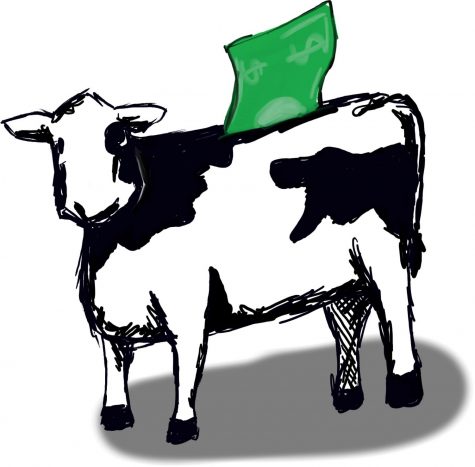Meeting the meat tax
January 29, 2020
Our planet is dying, and it has been for a very long time. The Arctic Ocean will be ice free in 30 years, according to NASA. It’s time to stop ignoring climate change. The very least we could do is stop contributing to it. Stop paying for our planet to die. Let’s advocate for a tax on meat.
The link between animal agriculture and climate change is clear. According to the Food and Agriculture Organization of the United Nations (FAO), animal agriculture is “one of the driving forces behind deforestation” leading to the extinction of multiple species of plants and animals each year.
This destruction of biodiversity “[releases] enormous amounts of carbon dioxide into the atmosphere,” according to the FAO.
If we’re talking numbers, Climate Nexus writes that beef consumption creates roughly 2,000 pounds of carbon dioxide each year.
“Replacing beef with plants would reduce that figure 96 percent, bringing it down to just 73 pounds of CO2e,” according to Climate Nexus.

Choosing a veggie burger instead of a beef burger saves a shocking amount of water. One pound of beef requires 1,799 gallons of water, according to National Geographic (NatGeo). NatGeo found that out of dozens of foods, animal products were the highest in resource expenditure, except for coffee and chocolate. A tax on meat will push us all away from eating it, saving millions of gallons of water for, you know, human use. Why are we using our precious freshwater for food we don’t need to survive?
Meat production takes up more resources than just water. The amount of land used to produce meat can’t be ignored. According to Global Agriculture, “nearly 60% of the world’s agricultural land is used for beef production, yet beef accounts for less than 2% of the calories that are consumed throughout the world.” Taxing meat will save land for crops that we can feed to humans.
Yes, livestock are the “middle men” in this process; we feed our crops to the animals, then eat the animals when we could easily eat the crops instead.
But since we won’t do that without being forced to, it’s time to be forced to. Taxing meat will lower meat demand, leading to less animals butchered for food. That means less strain on the environment.
The “sugar tax” implemented in various American cities and worldwide countries was successful in lowering sugary beverage consumption and lowering adverse health effects of sugar. A 2019 study conducted by the Annual Review of Public Health found that one year after Berkeley, California implemented its sugary beverage tax, “sales dropped by 9.6%, whereas sales of untaxed beverages rose by 3.5% and bottled water sales increased 15.6%.”
I compare the meat tax to the sugar tax not just because of the environmental benefits of reduced meat consumption, but the health benefits, too. The link between meat consumption and cancer is undeniable.
“Processed meat—from hot dogs to bacon—increases the risk of colorectal cancer, cardiovascular disease, and even early death,” the Physicians Committee for Responsible Medicine found. Bacon increases risk of cancer. Who knew?
The conversation on climate change is only going to get louder and more persistent. This is one way to nudge Americans into responsibility. Our choices make an impact; a hamburger today means one less day for our grandchildren. Stop choosing meat.

Ron • Jan 31, 2020 at 5:13 am
Lol. Hilarious!